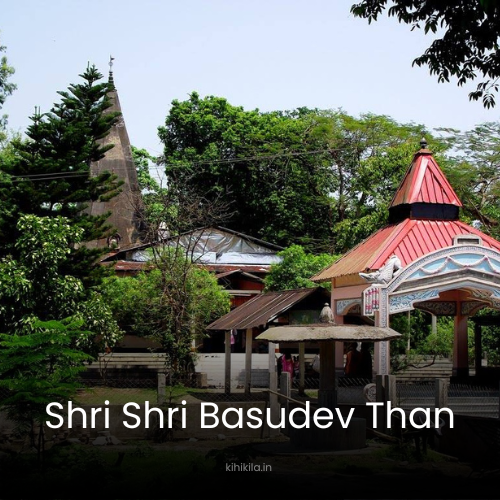Introduction
Shri Shri Basudev Than, also known as Narua Satra, is a revered temple in Assam with deep historical and spiritual significance. Situated in the northeastern part of Dhakuakhana, in the North Lakhimpur district, this sacred site has been a center of devotion for centuries. Established in the 17th century by Damodar Aata, the grandson of Srimanta Sankardeva, this temple carries an immense cultural and religious legacy. It stands as a symbol of Assam’s rich Vaishnavite traditions and continues to attract devotees and historians alike.
The Historical Significance of Shri Shri Basudev Than
The origins of this sacred site date back to the Ahom rule when King Jayadhaj Singha governed Assam. Damodar Aata, a prominent Vaishnavite preacher, traveled from Bijani Rajya to establish the Laumuri Satra, which later became Narua Satra. The name Narua Satra has been a subject of debate among scholars, with some believing that Damodar Aata hailed from Upper Assam.
The land for the Satra was originally gifted by a Brahmin named Bahude, and historical records suggest that in 1314, King Satyanarayan of Sadhayapur granted this land for Vishnu worship. Over time, the land changed hands within Brahmin families, leading to its renaming as Narua Satra. In 1323, King Lakhinarayan of Sadhayapuri further contributed to its religious development by dedicating the land to Ravidev Basaspati. His descendants later handed over the land to Damodar Aata, leading to the temple’s recognition as Basudev Than.
The Decline and Revival of Basudev Than
Following the passing of Damodar Aata in 1585, his son Ramakanta Aata became the Adhikar of the temple. During the Maan invasion of Assam, Ramakanta Aata struggled to manage the responsibilities of Basudev Than, as he was also overseeing the Balipara and Bardua Satras. As a result, Basudev Than suffered neglect, transforming into a desolate forest area.
It was not until the late 17th century that efforts were made to restore its former glory. Ramdev Ata, the successor to Ramakanta Aata, was recognized by the Ahom kings, and in 1707, King Gaurinath Singha attempted to visit Narua Satra but was forced to turn back. This event led to the naming of the location ‘Uvata Sampara.’
Over time, the temple’s structure weakened, and it was almost abandoned until a devoted individual named Rangain Aldhara from Jalbhari Gaon took the initiative to protect and care for the site. His dedication ensured that the temple remained intact for over fifty years. Later, an influential Vaishnavite, Achyut Ata, arrived from Bardua and, along with Rangain Aldhara, reconstructed the Satra. They discovered valuable artifacts near a canal, now known as Dhankhana Pukhuri.
Cultural and Religious Traditions of Basudev Than
Shri Shri Basudev Than holds immense religious importance, particularly among Vaishnavites. The temple celebrates ‘Pal Naam’ annually on Maghi Purnima, an event initiated by Achyut Ata when he consecrated the Basudev Mandir in its new structure. During his younger brother Mahesh Ata’s time, a grand Namghar was also built, strengthening the religious presence of the Satra.
Another significant belief associated with Basudev Than is linked to the legend of Rukmini, wife of Lord Krishna. It is said that she crafted the idol of Basudev, believing that Krishna would fulfill the prayers of those who worshipped it with devotion. This faith continues to inspire devotees who visit the temple, seeking blessings and spiritual fulfillment.
Unique Features of Basudev Than
Basudev Than spans approximately 200 bighas of land, comprising three slopes and sixteen highlands covered with dense forests. The entrance road is adorned with Ajars, adding to the temple’s serene ambiance. Nearby villages such as Ghanhibari, Amud Borbari, and Ubhatamukh have also contributed historical artifacts to the temple. A notable discovery in 1952 from Ubhatamukh was later placed in the temple, further enriching its heritage.
The Ramdhemali Gai Festival
One of the distinctive cultural events celebrated at Basudev Than is the Ramdhemali Gai festival, where ancient statues are worshipped. As part of the ritual, devotees offer animal sacrifices, while those who receive divine blessings often release animals and birds at the temple, symbolizing gratitude and devotion.
A Unique Tradition: Salt-Free Prasad
A rare tradition observed at Basudev Than is the preparation of Prasad without salt. Instead of salt, sugar is used, a custom that has been preserved for generations. This unique offering sets Basudev Than apart from other religious sites and remains an integral part of its rituals.
Shri Shri Basudev Than’s Legacy and Spiritual Significance
Basudev Than has remained a beacon of spiritual devotion in Assam for centuries. Despite facing periods of decline, the temple has stood the test of time, thanks to the unwavering dedication of its caretakers and devotees. Today, it continues to attract pilgrims who seek divine blessings and wish to connect with Assam’s rich Vaishnavite history.
The sacred site embodies the teachings of Srimanta Sankardeva and his disciples, preserving the spiritual and cultural ethos of the region. The temple’s historic contributions, unique traditions, and religious significance make it an invaluable heritage of Assam, ensuring that its legacy lives on for future generations.
Conclusion
Shri Shri Basudev Than is not just a religious site but a symbol of Assam’s enduring faith and heritage. From its establishment in the 17th century by Damodar Aata to its revival by devoted individuals, the temple has played a pivotal role in shaping Assam’s spiritual landscape. Its unique traditions, historical artifacts, and unwavering significance in Vaishnavite culture make it a treasure trove of history and devotion. For anyone seeking to explore Assam’s religious heritage, Basudev Than stands as a testament to the region’s rich and sacred past.












